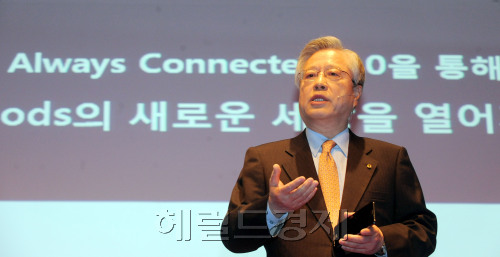Outlining vision for his second term, Chairman Lee says ‘no free lunch’
with network use
KT Corp. on Monday reaffirmed the company’s new vision of becoming a global media group expanding into businesses other than telecom services and doubling its current sales within three years.
“If there were industrial and globalization revolutions that changed the world dramatically over the past 200 years, the virtual goods revolution will make changes in the coming years,” said KT chairman Lee Suk-chae.
“And the revolution will be led by the olleh management of KT,” he said, unveiling an ambitious goal of increasing the company’s sales to 40 trillion won by 2015.
Lee, whose three-year second term was approved Friday at a shareholders’ meeting, declared the second period of the “olleh management” at a news conference on Monday.
The “olleh,” adopted in 2009, is hello written backwards to represent KT’s aim of embracing innovative methods in its operations.
Reflecting the company’s renewed slogan of innovation, the chairman was accompanied by young CEOs of KT’s newly affiliated venture companies, including Jimmy Kim of Ustream, 42, and Kim Kil-youn of Enswers, 35.
“In the era of convergence, what’s important is not just telecom service itself but also distribution of virtual goods via diverse platforms,” he said.
In 2009 when he was elected as the chief of the nation’s largest fixed-line operator, Lee also made it clear that telecom companies had no other way but to seek businesses other than telecom services.
“Our efforts to strengthen competitiveness are seeing some achievements since my inauguration three years ago. I believe we will become a global media company in the near future,” he said.
 |
KT chairman Lee Suk-chae speaks at a news conference in Seoul on Monday. (Ahn Hoon/The Korea Herald) |
The former telecom minister is affectionately nicknamed “Bulldozer” for his relentless leadership.
In 2009 after he took the helm, KT was the first to introduce Apple’s iPhone into the Korean market despite criticisms from local handset makers and other industry watchers.
Lee also declared the acquisition of KTF, a former subsidiary specializing in mobile communications services, to transform the company into a service provider.
During the years, the iPhone became a global hit affecting the whole industry, while KT narrowed the gap with the market leader SK Telecom.
Ahead of approval of his second term last year, however, he also faced backlash in highly publicized events such as the shutdown of the second-generation mobile service and the Internet cut of Samsung-made smart TVs.
“The end of 2G services was an unavoidable choice for us to offer more advanced services. That would ultimately benefit customers,” he said.
Lee also stressed his strong will to urge makers of smart devices to share the costs of network operation, saying “There should be no free lunch to use limited resources such as electricity and network.”
KT also needs to catch up with its rivals when it comes to the fourth-generation Long Term Evolution service.
Unlike SK Telecom and LG Uplus, which started the faster service in July last year, KT jumped into the market belatedly in January this year as its 2G service shutdown had been delayed.
“We have secured competitiveness based on our own Cloud Computing Center, which reduces time and cost of LTE network coverage. Our LTE service would gain momentum in April when the coverage is completed in some 80 cities nationwide,” he said.
In order to prepare for this year’s new investments into LTE and other software development, KT has recently tightened belt by declaring an emergency management system.
By Lee Ji-yoon (
jylee@heraldcorp.com)








